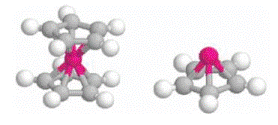Department of Physics and Astronomy: Publications and Other Research

Peter Dowben Publications
Document Type
Article
Date of this Version
November 2005
Abstract
Magnon-plasmon interactions are modeled by considering the spin-dependent dielectric response of atoms placed in crystalline environment. Hund's exchange rules favor parallel spin alignment, but the strength of the exchange depends on the displacement of the centers of gravity of the atomic spin-up and spin-down electron charge clouds. The intra-atomic exchange is modeled by considering a Hubbard-type interaction, and interatomic interaction then yields a k-space dispersion. The eigenmodes of the plasma are a mixture of spin-up and spin-down degrees of freedom, described by a 2×2 interaction matrix. Minority and majority bands yield different plasmon frequencies. However, these modes are not orthogonal but coupled by intra-atomic exchange and obtained by explicit matrix diagonalization. The effect is largest for small wave vectors, in agreement with experiment. ©2006 American Institute of Physics


Comments
Published J. Appl. Phys. 99 (2006). Permission to use.